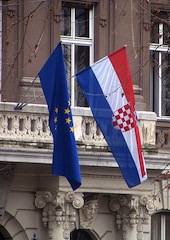The Balkans: Europe’s Soft Underbelly
Can Europe prosper while ignoring the Balkans? Anyone remember what triggered the first world war?
June 1, 2013

On July 1, 2013, Croatia will become the 28th member of the European Union. There is unlikely to be much celebration anywhere outside Croatia because Europe is in the doldrums and the European Project in jeopardy.
Politicians and the citizenry alike are focused on the crisis and the survival of the Euro.
Beyond these current worries, Croatia’s accession — like Estonia’s recent adoption of the euro — underline the enduring and remarkable attractiveness of the European Union and indeed its huge long-term success.
On a less positive note, we have to be mindful of one of the world’s most unpleasant anniversaries, that of the beginning of World War I. On June 28, 1914, with the assassination in Sarajevo, that world war was set into motion.
A century onward, the EU accession of Croatia on July 1, 2013 redraws the borderlines of Europe more or less to where they were in 1914.
Happy sentiments aside, this also reminds us of the inability of Europe to fully heal the wounds of a conflict that left it in ruins with millions of dead and led directly to the Bolshevik revolution and World War II.
What is called, in current “Euro-speak,” the Western Balkans is as divided today as it was in 1914.
In the past decade or so, the Western Balkans have been quiescent. They have thus disappeared from the public eye — and, it would seem, from the interests of ordinary Europeans.
They have faded from the attention even of those in the European Commission who are paid to continue, however reluctantly, various partnership or candidacy talks with the six countries from the region: Albania, Bosnia, Kosovo, Macedonia, Montenegro and Serbia.
The latter three are officially “candidate” countries with negotiations that have either not started or move at glacial speed.
The remarkable thing is that none of the six countries in the Western Balkans have solved their border issues, ethnic relations or corruption.
While the violent conflict has receded and though another outbreak is unlikely to be repeated soon, the problems have merely been postponed.
Economic growth in the Balkans in the past decade, with the exception of Albania, has been anemic. The levels of incomes of all countries in the region remain significantly below the EU average (under $10,000 per person against almost $30,000 for the EU).
The countries’ current income levels are, moreover, often below the peak incomes previously achieved: Serbia’s GDP per capita today is equal to its 1975 level, Macedonia’s no higher than in 1979, Bosnia’s only 20% above the 1980 level.
While democracy, in the sense of free media and generally fair and free elections, seems relatively safe (despite periodic voting disputes, as recently seen in Montenegro, progress on the rule of law has been minimal.
This leads us to the wider European conundrum. I am not referring to the one about the euro and the potential fiscal and political union, but perhaps a more important one, dealing with the long-term future of Europe.
Europe will not be complete, nor will the possible seeds of conflict in the Balkans be eradicated until the region, like Southern Europe in the 1980s and Eastern Europe in the 2000s, is safely anchored within the European Union.
Moreover, it is only when these countries become members that their unresolved border issues and potential ethnic conflicts will become manageable.
It is also only as EU members that this collection of small and barely viable countries will have a chance to grow faster economically and eventually catch up with the rest of Europe.
In short, both security and economic reasons clearly dictate the need for the EU to absorb the Balkans. And the sooner it is done, the faster Balkan countries will converge to European standards.
This process begins with the rule of law and extends all the way to economic development.
So much for what is right and good. The problem with this grand theory is that never has the time been less propitious in practice to call for further European enlargement.
Croatia will become a member mostly because its accession was agreed and promised before the 2008 financial crisis. The country’s inclusion also brings with it relatively few problems, having solved its relations with the neighboring countries.
But very few people in Europe envisage a continuation of this process in such a manner where it would lead to an early accession of the other six countries.
Not only would this six-pack bring with it a host of real problems, migration not being the least. Small as they may be, they would also add further pressure on the already strained European finances.
With the unsettled relationship between Europe’s North and South, the UK threatening to leave the Union, widespread recession and an all-European rate of unemployment above 12%, there has never been less desire among Europe’s rich to think about, and even less to help, Europe’s poor.
The powerful fears of migration and new fiscal transfers, playing against the background of high unemployment and low growth, almost fully predispose European public opinion to postpone Balkan accession for the foreseeable future.
“Eventual” accession, a term which politicians are fond of using, in reality means “never”, or at least not until the economic and political conditions change much for the better in Europe itself.
Yet without integration, the gaps between Europe and the Balkans will continue to increase.
Can Europe prosper with a soft underbelly where drug trade, human trafficking and money laundering are rampant? Can it afford not to do so in a region where three powerful geopolitical forces (the West, Islam and Russia) meet?
Perhaps Europe may wish to treat the Balkans the way the United States treats Central America: with general indifference, emphasis on drug trade interdictions and allowance of some moderate migration.
But this does not really seem a useful analogy. Geographical and political distance between the United States and Central America is much greater than between Europe and the Balkans. The geopolitical stakes are entirely different too.
Moreover, standard U.S. policy toward its southern neighbors has been one of forgetfulness and neglect, benign or otherwise.
The promise of the European Union was different. But as it is, Europe would be unprepared, perhaps even more so than in 1991, for the breakout of another Bosnian war.
Hard though it may be to imagine, neither a conflict between Serbia and Kosovo nor a civil war in Macedonia can yet be entirely excluded.
It would thus make much more sense for Europe to take a longer-term view and to move forcefully towards speedy integration of the Western Balkans.
Then, within a decade, it should move to allowing yet an even greater geopolitical change, the accession of Turkey.
But while these seem most desirable as goals, they are hardly likely to be achieved in the current European political climate. In fact, it is not an overstatement to say that these objectives have never been further from realization.
So let’s remember this: When European leaders meet in a year’s time on the bridge in Sarajevo where Archduke Franz Ferdinand’s assassination in 1914 launched a world war, they would be toasting to a Europe that is not yet whole.
Read previous

German Diplomacy and French Intransigence
May 31, 2013
